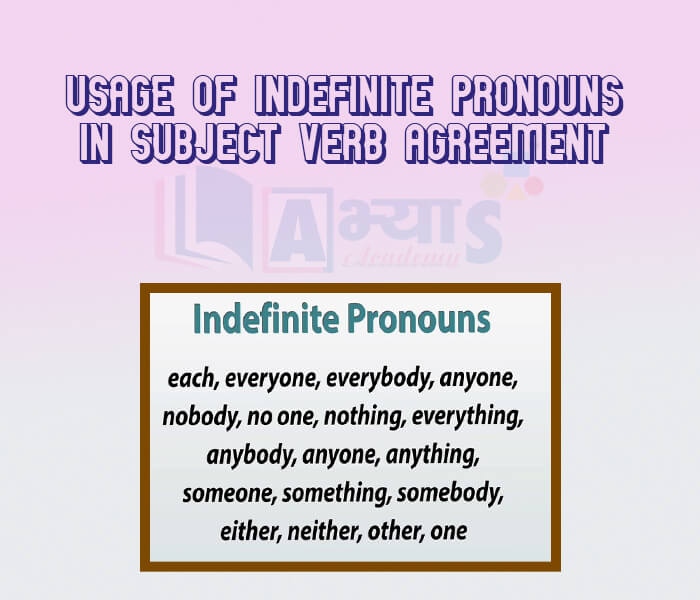Usage of Indefinite Pronouns in Subject Verb Agreement


Usage of Indefinite Pronouns in Subject Verb Agreement
Usage of Indefinite Pronouns in Subject Verb Agreement: The verbs , indefinite pronouns use depend on whether the indefinite pronouns are singular or plural. We can divide them into three groups: the singular indefinite pronouns use singular verbs and the plural indefinite pronouns use plural verbs. The third group consists of some indefinite pronouns which may be singular or plural.
A) The singular indefinite pronouns use singular verbs : like another, anybody, anyone, anything, each, either, enough, everybody, everyone, everything, little, much, neither, nobody, no one, nothing, one, other, somebody, someone, something, use singular verbs.
B) Indefinite pronouns that are always plural: like both, few, many, others, several, use plural verbs. Examples:
C) Indefinite pronouns that can be singular or plural: all, any, either, more, most, none, some, such Indefinite pronouns that can be singular or plural. Examples:
Students / Parents Reviews [10]
Abhyas is a complete education Institute. Here extreme care is taken by teacher with the help of regular exam. Extra classes also conducted by the institute, if the student is weak.

Om Umang
10thAbhyas Methodology is very good. It is based on according to student and each child manages accordingly to its properly. Methodology has improved the abilities of students to shine them in future.

Manish Kumar
10thIt was a good experience with Abhyas Academy. I even faced problems in starting but slowly and steadily overcomed. Especially reasoning classes helped me a lot.

Cheshta
10thBeing a parent, I saw my daughter improvement in her studies by seeing a good result in all day to day compititive exam TMO, NSO, IEO etc and as well as studies. I have got a fruitful result from my daughter.

Prisha Gupta
8thI have spent a wonderful time in Abhyas academy. It has made my reasoning more apt, English more stronger and Maths an interesting subject for me. It has given me a habbit of self studying

Yatharthi Sharma
10thOne of the best institutes to develope a child interest in studies.Provides SST and English knowledge also unlike other institutes. Teachers are co operative and friendly online tests andPPT develope practical knowledge also.

Aman Kumar Shrivastava
10thAbout Abhyas metholodology the teachers are very nice and hardworking toward students.The Centre Head Mrs Anu Sethi is also a brilliant teacher.Abhyas has taught me how to overcome problems and has always taken my doubts and suppoeted me.

Shreya Shrivastava
8thIt was good as the experience because as we had come here we had been improved in a such envirnment created here.Extra is taught which is beneficial for future.

Eshan Arora
8thMy experience with Abhyas is very good. I have learnt many things here like vedic maths and reasoning also. Teachers here first take our doubts and then there are assignments to verify our weak points.

Shivam Rana
7thMy experience was very good with Abhyas academy. I am studying here from 6th class and I am satisfied by its results in my life. I improved a lot here ahead of school syllabus.
